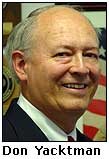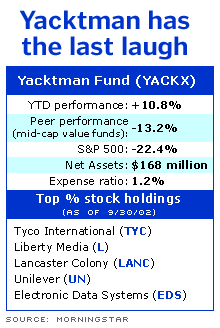NEW YORK (CNN/Money) – Like many value fund managers, Don Yacktman was labeled a has-been in the go-go years of the late 90s.
Yacktman resisted the urge to jump on the tech bandwagon and suffered mightily. Although his eponymous fund made money in 1997 and 1998, it lagged the S&P 500. Yacktman's own board of directors even tried to oust him in 1998 but failed. It didn't help matters that Yacktman lost money in 1999, a year when the S&P was up 19.5 percent and the Nasdaq surged a mind-numbing 85.6 percent.

But value is back in a big way. And Yacktman has transformed himself from a bull market pariah to a bear market hero. As of Dec. 19, his two funds were on track to post their third consecutive year of gains.
The Yacktman fund was up 13.5 percent in 2000, 19.5 percent last year, and currently is up 10.8 percent year-to-date. Yacktman's other fund, Yacktman Focused, posted gains of 6.6 percent in 2000 and 17.1 percent last year. It's up 13.9 percent as of Dec. 18.
How has Yacktman done it? By sticking to his strategy of buying stocks only when he thinks the market has gone overboard in punishing them. "We look for great businesses that usually have some short-term problem that is either real or perceived," he says.
To that end, Yacktman's top holding in both funds is Tyco International, the maligned conglomerate.

"When people hear that they cringe, but it's a lot different when you buy Tyco at $10 than at $60, and a lot different when you do your homework and realize this is not another Enron or WorldCom," Yacktman says. Tyco recently traded at $16.98.
Yacktman certainly is not afraid of other former Wall Street darlings. His second-biggest holding is Liberty Media, the investment company controlled by cable mogul John Malone. Yacktman says his average cost on his Liberty holdings is $8, nearly 50 percent below the stock's 52-week high. It recently traded at $9.25.
He even has been buying bonds of some beaten down telecom companies. Yacktman owns about $43 million worth of Qwest bonds that yield 7.9 percent. He also owns convertibles (bonds that can be converted into common stock) of networking companies Juniper Networks and Ciena. His rationale is that none of these companies is likely to go out of business, but that the stocks are too pricey. So the bonds are a safer bet.
Other examples of companies that Yacktman owns even though the market currently despises them are AOL Time Warner, the parent company of CNN/Money, Gemstar-TV Guide, Bristol Myers Squibb and EDS. Yacktman says his average cost on AOL was $13, so he's sitting on a slight gain on that investment. AOL recently closed at $13.14. He is about break-even on his EDS investment as well but down slightly on Gemstar and Bristol-Myers Squibb.
As for the market...
Yacktman is not an overt bear -- he thinks that fair value for the S&P 500 is about 960, 8 percent higher than current levels -- but he is sitting on a sizable portion of cash. The Yacktman fund has about 25 percent of its assets in cash while the Yacktman Focused is about 30 percent in cash. Yacktman says he hasn't sold stocks to raise cash; large inflows to the fund have boosted his cash position. And although he went on a buying spree during the summer when valuations were lower, Yacktman doesn't see as many bargains now.
"We're holding off for the real sweet pitches right across the plate," says Yacktman, who is not afraid of sports clichés. Here's another one he used to describe his conservative style of investing: "Offense is exciting but defense brings you championships."
Investors certainly learned the hard way that big market gains often lead to painful bubbles. And even though Yacktman did not participate in the big gains of the late 1990s bull market, he's proud that the long-term investors who stuck with him have not lost money. Still, he's not gloating.
"I've long since learned that in this business, one is much better off to be humble," he says. "We're being rewarded lately but I don't want to shove it down someone's throat."

|

